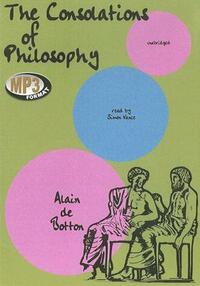Take a photo of a barcode or cover
hopeful
informative
reflective
slow-paced
Mixed review for me in reading this. I thought the first four consolations (On Unpopularity, On Happiness On Frustration On Insecurity and Ignorance) to be extremely insightful and definitely piqued my interest to further read the philosophers that are referenced in those sections. If the book had stopped there it would be a 5-star book for me. However, the last two sections (On Broken Hearts and On Difficulties) to be more lackluster. I found the arguments made in those to be less compelling and to some extent more just whiny in general. Those sections would be a 3 star for me. Overall still definitely worth the read and was extremely thought-provoking, even in the sections I found less enjoyable.
Good, short introductions to a few important philosophers. Those who happen to feel as de Botton does on most issues will find this book rewarding, but those who don't will find it biased and not useful. He's an insightful reader of literature and philosophy, and at the very least this book might make you want to read more of the philosophers whose work he examines.
Absolutely enjoyed every minute of Alain de Botton's analysis of ancient philosophers. He summarizes their ideas for the non-philosophy major, applies these ideas to moderns problems, and voila - it's an enjoyable read. Similar to his approach to Marcel Proust, he reads the big books so we won't have to - or to lure us into picking up the more weighty subjects.
I'll be buying this one so I can re-read when I need to think big thougnts.
I'll be buying this one so I can re-read when I need to think big thougnts.
It's a good help - to the point, with digestible information. My only gripe with it is that some of the ideas are presented in an over-simplistic, reductive fashion (especially the chapter on heartbreak, which took such a hetero normative approach with the same argument made over and over again?). That being said, I'll definitely come back to some portions of the book.
challenging
funny
informative
inspiring
relaxing
fast-paced
Botton gently introduces the thoughts of six different philosophers in this guide to philosophy as self-help.
informative
inspiring
reflective
medium-paced
adventurous
informative
reflective
medium-paced
A brilliant foundation work for philosophy and how we can still benefit from it in contemporary life
informative
inspiring
reflective
relaxing
medium-paced
Very easy to read and informative. Was a nice introduction into the philosophy of Socrates, Epicurus, Seneca, Montaigne, Schopenhauer and Nietzsche.
Socrates - The majority do not determine what is right - reason does.
Epicurus - Happiness is found in friends not finance.
Seneca - Use reason to know when to follow the cart. Embrace the worst outcome and understand that it will not affect your peace of mind.
Montaigne - Humans fail, smell, err. And that's okay. Seek to be wise.
"A virtuous, ordinary life, striving for wisdom but never far from folly, is achievement enough."
Schopenhauer - Suffering is part of the human experience, expect it.
Nietzsche - Take the good with the bad. It's worth enduring hardship to reach the peak.
Socrates - The majority do not determine what is right - reason does.
Epicurus - Happiness is found in friends not finance.
Seneca - Use reason to know when to follow the cart. Embrace the worst outcome and understand that it will not affect your peace of mind.
Montaigne - Humans fail, smell, err. And that's okay. Seek to be wise.
"A virtuous, ordinary life, striving for wisdom but never far from folly, is achievement enough."
Schopenhauer - Suffering is part of the human experience, expect it.
Nietzsche - Take the good with the bad. It's worth enduring hardship to reach the peak.


